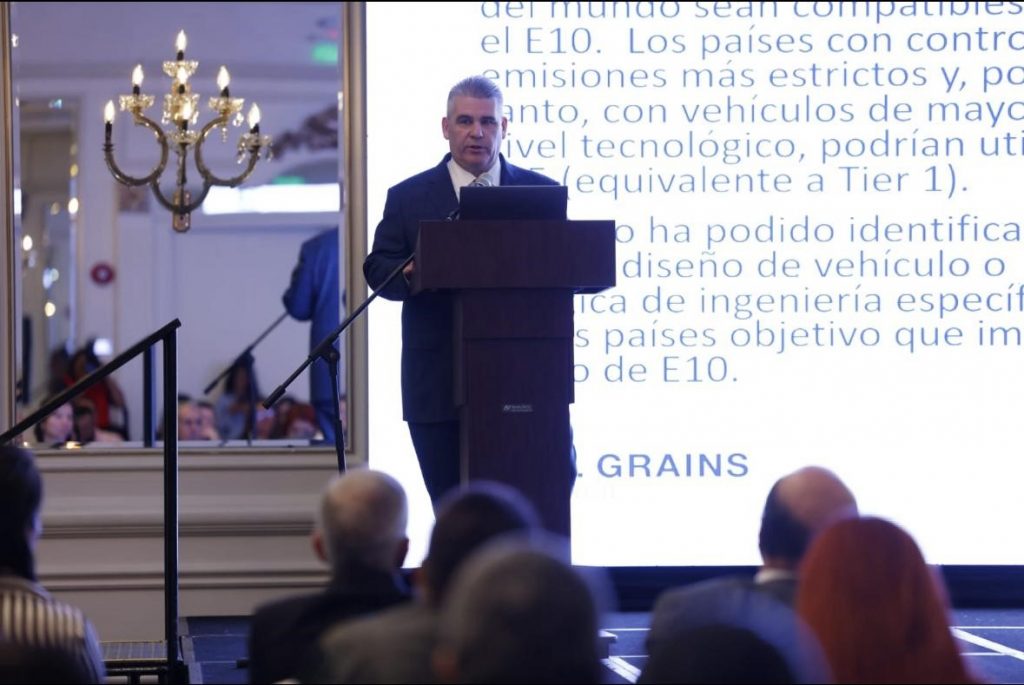The U.S. Grains Council’s (USGC’s) Latin America (LTA) office recently collaborated with the Pan-American Coalition of Liquids Biofuels (CPBIO), the Inter-American Institute for Cooperation on Agriculture (IICA) and the Association of Renewable Fuels of Guatemala (ACR), among other partners, to organize the “Sustainable Mobility: Opportunities of Ethanol in Guatemala” conference in Guatemala City.
The conference played a pivotal role in exploring successful international cases in the development of ethanol-gasoline blending programs. It also addressed lingering doubts and concerns within the country regarding ethanol use, particularly focusing on the technical performance of vehicles and the needs in infrastructure and logistics for blending ethanol.
Distinguished speakers at the conference included Victor Hugo Ventura, Guatemala’s new minister of Energy and Mines, and high-level representatives from the Ministry of Environment and Natural Resources (MARN), Guatemala’s Renewable Fuels Association (ACR) and the Alcohol Producers Association of Guatemala (APAG). International speakers included Cary Sifferath, USGC vice president; Agustin Torroba, IICA biofuels specialist; Alvaro Lorenzo, CEO of Alcohols of Uruguay; and representatives from the biofuels sectors of Argentina, Uruguay, Colombia and the United States.
Sifferath highlighted Guatemala’s strides in the ethanol-gasoline blending program, recognizing the country’s progress after several decades of relevant legislation.
“Guatemala is undergoing an interesting process, advancing in ethanol-gasoline blending after decades of having legislation in this regard. Insights from successful international experiences, including those of Vietnam, Japan, Canada, India and Nigeria—some supported by the U.S. Grains Council—will undoubtedly help Guatemala in its journey to decarbonize the transportation sector,” Sifferath said.
The conference drew more than 125 participants from various sectors in Guatemala, including public and private, academia, the international community, environmental organizations and the media. The conference continued to highlight the opportunities of ethanol as a clean and alternative fuel source, with key topics including the sharing of international ethanol experiences, discussions on the socio-environmental benefits of ethanol blending, considerations of vehicle compatibility and the development of favorable public policies for biofuels in Guatemala.
“The road ahead for Guatemala to begin blending ethanol with gasoline is still complex, especially given that a new government will likely revise some public policies. However, these developments underscore Guatemala’s commitment to embracing ethanol as a sustainable and impactful solution in its energy landscape,” said Federico Salcedo, USGC LTA regional ethanol consultant.
Despite approving a Biofuels Law (Decree 17-85) in 1985, Guatemala still lacks a mandate for ethanol blending with gasoline nearly four decades later. As the leading ethanol producer in Central America, with an annual capacity of 69.7 million gallons primarily derived from molasses, a by-product of sugar production, Guatemala exports approximately 85 percent of its production to the U.S. and European markets.
Recent progress includes advancements in Guatemala’s ethanol blending regulatory framework. In July 2023, the Ministry of Energy and Mines issued Governmental Agreement 159-2023, establishing regulations for the Fuel Alcohol Law. Subsequently, on Jan. 11, 2024, technical standards were published, outlining some conditions for ethanol blending with gasoline. These regulations advocate for a 10 percent ethanol blend (E10) starting January 2025, promoting open competition and prioritizing environmental considerations.
About The U.S. Grains Council
The U.S. Grains Council develops export markets for U.S. barley, corn, sorghum and related products including distiller’s dried grains with solubles (DDGS) and ethanol. With full-time presence in 28 locations, the Council operates programs in more than 50 countries and the European Union. The Council believes exports are vital to global economic development and to U.S. agriculture’s profitability. Detailed information about the Council and its programs is online at www.grains.org.

